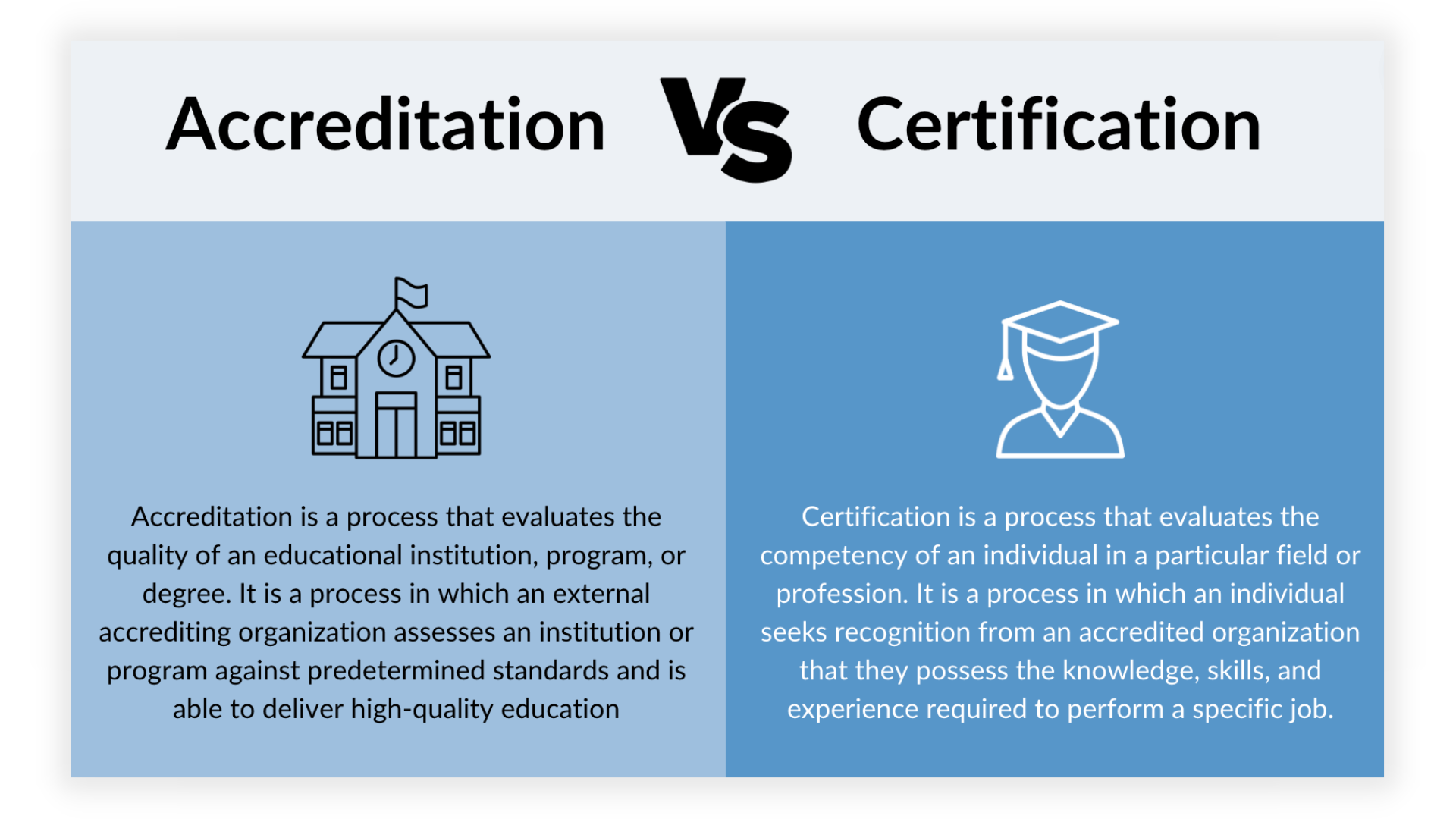Have you ever wondered whether your institution needs accreditation or your staff needs certification — or both? Choosing the wrong path can cost you time, money, and credibility.
Accreditation evaluates and validates the quality of an entire institution or program. It's a formal recognition by an authorized body, like the ACCME for medical education, ensuring the organization meets specific standards of excellence.
Conversely, certification typically applies to individuals, verifying their competence and qualifications against established criteria. It can also apply to products or systems. For instance, an accredited university may employ professors who hold professional certifications in their fields.
Essentially, accreditation is about institutional quality assurance, often required for licensure or funding. Certification is about individual or product-level competency, which is usually voluntary.
The two work in tandem to uphold high standards, ensuring both the educational program and the professional are qualified, thereby maintaining the overall reputation and quality within an industry.

| Attribute |
Accreditation |
Certification |
| Primary focus |
Quality of an organization or program |
Competency of a person, product, or specific program |
| Who grants |
Accrediting bodies (organizations) |
Certification bodies, professional bodies, vendors |
| Typical use cases |
Educational institutions, training providers, programs awarding CE credits |
Professional credentials, product conformity, micro-credentials |
| Evidence required |
Institutional policies, systems, self-study, peer review |
Exams, evaluations, competency evidence, assessments |
| Typical timeline |
6–24 months |
2–12 months |
| Typical cost drivers |
Self-study resources, site visits, application fees, consulting |
Exam development, psychometric validation, platform, maintenance |
| Renewal |
Periodic reaccreditation cycle (every 3–7 years) |
Recertification or continuing requirements (1–5 years) |
| Regulatory effect |
Often required for funding, licensure, reimbursement |
May be required for hiring or professional recognition |
| Who benefits most |
Institutions and programs seeking formal recognition |
Individuals, employers, or products needing proof of competency |
What Is Accreditation?
Accreditation is a formal recognition process that validates an institution, program, or organization's quality and credibility.
It involves a thorough evaluation by an independent, authorized body against established standards.
Accreditation ensures that the entity meets or exceeds specific criteria for excellence in its field. This process promotes continuous improvement, accountability, and public trust in various sectors, including education, healthcare, and professional services.
Understanding the Various Types of Accrediting Bodies
There are many different accrediting bodies. Organizations who wish to get accredited must go through their industry's specific accrediting body.
For example, if you are looking to get accredited to deliver continuing medical education to doctors, you will go through the ACCME. If you are looking to get accredited to deliver continuing education to business proffessionals, you will have to go through IACET.
Some industries have state-specific accrediting bodies. For example, if you'd like to deliver continuing legal education to lawyers, you will have to apply for accreditation to each state bar association to deliver CLE in that state.
If you are looking to get accredited to deliver continuing education, and unsure who your accrediting body is, you should check out our How To Get Accredited Official Guide. On that page, we outline 21 industries, their accrediting bodies, and first steps you can take towards accreditation.
What Is Certification?
Certification is a formal process that validates an organization, product, or individual's compliance with established standards or criteria. It involves a thorough audit conducted by an accredited body to ensure adherence to specific requirements.
Certifications serve as credible proof of competence, quality, or expertise in various fields.
They can verify management systems, product standards, or an individual's professional qualifications, providing assurance to stakeholders and often being necessary for certain practices or market access.

First, Second and Third-Party Certification Levels
Certifications can also serve as a testament to the quality, safety, and compliance of products, services, or systems. However, not all certifications are created equal.
They can be broadly categorized into first-party, second-party, and third-party certifications, each differing in their level of credibility and acceptance.
First-party certification is essentially a form of self-assessment. In this case, an organization or individual assesses their own products, services, or systems against a set of standards or requirements, and asserts that they are in compliance.
This type of certification can be used for internal purposes, such as quality assurance checks, product development, and continuous improvement efforts. However, it may not always be recognized by external entities, given the potential for bias in self-assessment.
Second-party certification involves an assessment performed by an entity that has a relationship with the party being certified. This could be a business partner, a customer, or a trade association, for instance.
The certifying entity evaluates the products, services, or systems of the other party to ensure they meet specific standards or requirements. This type of certification is often used in business-to-business transactions, where one company wants assurance that a supplier's products or services meet its standards.
Third-party certification, on the other hand, is considered the most credible and widely accepted form of certification. In this scenario, an independent organization with no vested interest in the transaction between the first and second parties conducts the assessment.
These third-party certifiers evaluate products, services, or systems against internationally recognized standards or requirements. If the criteria are met, they issue a certificate attesting to the compliance. This type of certification provides a high level of trust and assurance, as it is carried out by an impartial and competent body. Examples of third-party certification include ISO certification for quality management systems or organic certification for food products.
When Accreditation Is Required vs When Certification Suffices
Accreditation is typically required when professionals must meet regulatory or licensure standards, such as physicians earning CME through ACCME or attorneys fulfilling CLE hours with bar-approved providers.
It validates that the training meets industry-wide quality benchmarks and is recognized by governing bodies. Certification, on the other hand, often suffices for skills-based or role-specific learning where formal regulation is not involved.
For example, project managers may pursue PMI certifications or HR professionals may seek SHRM credits. While accreditation ensures compliance, certification demonstrates proficiency and career advancement in fields that may not have strict licensing requirements.
| Aspect |
When Accreditation Is Required |
When Certification Suffices |
| Purpose |
Ensures compliance with regulatory or licensure standards |
Demonstrates mastery of specific skills or knowledge |
| Common Industries |
Healthcare, legal, education, finance (regulated professions) |
Business, IT, HR, project management, emerging technical fields |
| Oversight |
Granted by accrediting bodies (ACCME, ANCC, State Bars, etc.) |
Issued by professional organizations or industry groups |
| Recognition |
Widely accepted by governing boards, state agencies, and regulators |
Recognized within industries and employers, not always legally required |
| Examples |
CME for physicians, CLE for attorneys, CEU for nurses and teachers |
PMI Project Management Certification, SHRM-CP for HR, CompTIA for IT |
| Outcome |
Required for maintaining licenses, practicing legally, and advancing careers |
Enhances skills, builds credibility, and supports professional growth |
What Is The Difference Between Accreditation and Certification?

One key difference between accreditation and certification is the focus. Accreditation focuses on evaluating the quality of an institution or program, while certification evaluates the competency of an individual.
Another difference is the level of authority. Accreditation is typically granted by an external accrediting organization, while certification is granted by a certifying or accredited organization.
Additionally, accreditation is often required for institutions or programs that receive federal funding or state licensure, while certification is typically voluntary.
It is important to note that accreditation and certification can work in tandem to ensure quality education and competent professionals.
For example, schools or educational programs may be accredited by an external agency, and also require faculty members to hold specific professional certifications within their subject areas. In this way, both accreditation and certification contribute to maintaining the overall quality and reputation of an institution or program.
Wrapping Up: The Key Takeaways on Accreditation and Certification
In conclusion, while the terms accreditation and certification are often used interchangeably, it is important to understand the distinctions between the two concepts.
Accreditation focuses on assessing the quality of an institution or program, while certification assesses the competency of an individual. Both processes are voluntary, but can contribute to maintaining the overall quality and reputation of an educational institution or professional field.
Educators and professional development specialists should be aware of these differences in order to make informed decisions and ensure the best outcomes for their students and professionals.
Accreditation and certification play vital roles in upholding quality standards and ensuring professional competence in various industries. By understanding their distinctions and exploring the available resources, individuals and organizations can make informed decisions that align with their educational and professional goals.
When deciding between accreditation and certification, it helps to consider how each option impacts both organizations and individual professionals.
For organizations, accreditation offers major benefits like enhanced credibility, ability to meet regulatory compliance, and improved institutional reputation. But it can also be costly, bureaucratic, and time-consuming to maintain.
For individuals, certifications tend to be more agile: they allow targeted skill building, often have shorter timelines, and can directly improve employability. On the downside, not all certifications carry equal weight—some are not universally recognized or may be less rigorous. Understanding which benefits and drawbacks matter most in your context is key.
The landscape of accreditation and certification is evolving rapidly. Digital badges, micro-credentials, and blockchain-verified certifications are gaining traction, offering flexible and more transparent ways for professionals to demonstrate skills.
At the same time, accrediting bodies are moving toward more outcome-based and student-centric evaluations rather than traditional input metrics. Cross-border recognition and standardization are also becoming more important, especially in global industries like healthcare, tech, and professional services.
Awareness of these trends can help organizations and individuals stay ahead—making sure they choose credentials that will continue to be valued tomorrow, not just today.


